As a bird lover, nothing is more distressing than experiencing the loss of your budgies repeatedly. If you find yourself wondering ‘Why do my budgies keep dying’, it is crucial to understand the natural lifespan of these birds, common causes of budgie deaths, and measures you can take to prevent sudden deaths.
Your budgies might keep dying due to illness, poor diet, and stress. Environmental and genetic factors can also be the reasons. Also, stress and lack of social interaction are common causes of death among budgies.
Let’s explore the different reasons why buddies might die a sudden death. It will help you provide better care for your feathered friends.
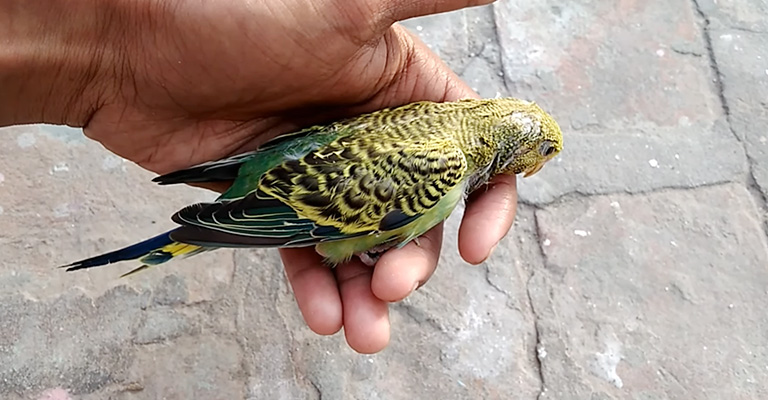
What’s the Natural Lifespan of Budgies?
Understanding the typical lifespan of budgies can give you insight into their expected lifespan and help you assess if their deaths are occurring prematurely. The average lifespan of a budgie ranges from 5 to 10 years.
However, with proper care, some budgies have been known to live up to 15 years or more. Here are a few factors that can influence a budgie’s lifespan:
- Genetics: Budgies with a strong genetic background tend to live longer.
- Diet: A nutritious and balanced diet plays a vital role in a budgie’s overall health and lifespan.
- Environmental conditions: Providing a safe, clean, and stress-free environment can contribute to a budgie’s longevity.
- Veterinary care: Regular check-ups and prompt treatment of any health issues can prolong a budgie’s life.
- Exercise and mental stimulation: Adequate physical activity and mental engagement can enhance a budgie’s overall well-being.
Why Do Budgies Keep Dying?
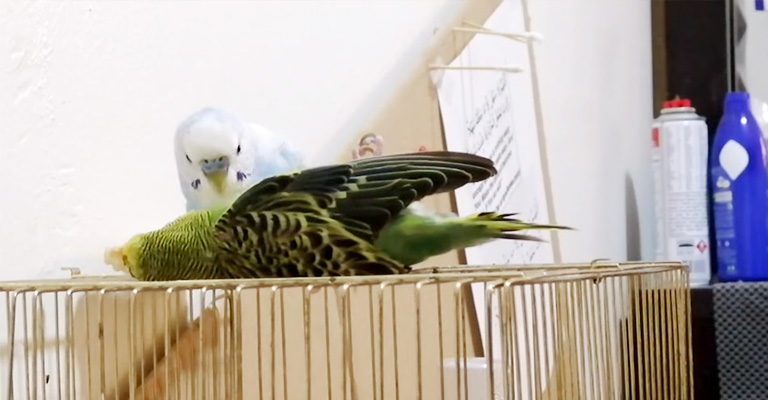
Unfortunately, budgies can be susceptible to various health issues and environmental factors that can lead to premature death. Here are eight common causes of budgie deaths:
Disease or Illness
Just like other Avians, budgies are susceptible to various diseases and health issues, including respiratory infections, parasites, nutritional deficiencies, and organ failure.
These infections can be caused by bacteria, viruses, or other pathogens and can lead to severe respiratory distress if left untreated. In some cases, the infection can spread rapidly or become complicated, overwhelming the body’s ability to fight off the infection and resulting in death
It’s crucial to ensure that your budgies receive proper veterinary care and regular check-ups to identify and treat any potential health problems.
Environmental Factors
As Budgies are sensitive to their environment, certain conditions can be detrimental to their health. Factors such as extreme temperatures, drafts, exposure to toxic substances (such as household chemicals or plants), poor air quality, and inadequate cage conditions can all negatively impact budgie health.
Poor Diet and Nutrition
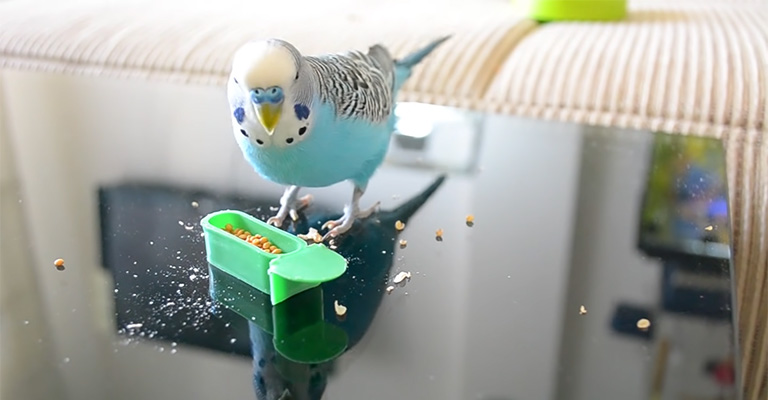
Your budgies require a balanced and nutritious diet to thrive. Feeding them a diet consisting solely of seeds is inadequate and can lead to malnutrition.
It’s important to provide a varied diet that includes fresh fruits, vegetables, and high-quality pellet food. You can also give them occasional treats specifically formulated for budgies.
Stress and Social Interaction
Budgies are social animals and need mental stimulation and social interaction to stay healthy and happy. Lack of socialization, isolation, or exposure to constant stressors can weaken their immune system and make them more susceptible to illness.
Genetic Factors
Some budgies may have genetic predispositions to certain health issues. If your budgies are from the same bloodline or breeder, there could be underlying genetic conditions that increase the likelihood of illness or early mortality.
Chronic Respiratory Diseases
Budgies, like humans, can suffer from chronic respiratory conditions such as asthma, chronic obstructive pulmonary disease (COPD), or pulmonary fibrosis. These conditions can cause persistent inflammation, narrowing of the airways, and damage to lung tissue.
Over time, impaired lung function can progress and lead to respiratory failure, where the lungs are unable to provide enough oxygen to the body or remove carbon dioxide effectively.
Allergic Reactions
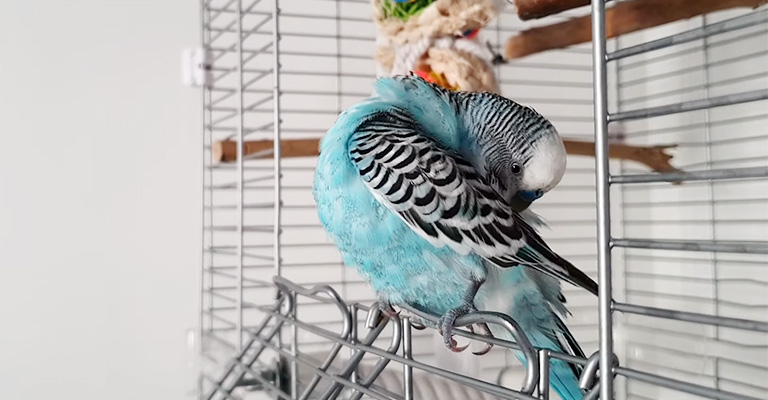
Too often, allergic reactions to certain substances or environments cause death in budgies. These allergic reactions can cause the airways to narrow and constrict, leading to difficulty in breathing. In severe cases, a severe allergic reaction called anaphylaxis can occur, which can rapidly progress and cause respiratory failure if not treated promptly.
Smoke Inhalation
Exposure to smoke, whether from fires or toxic fumes, can cause severe damage to the respiratory system. Inhaling smoke can irritate the airways, leading to inflammation and swelling.
It can also introduce harmful chemicals and toxins into the lungs, causing acute respiratory distress syndrome (ARDS) or other respiratory complications that can be fatal.
Trauma or Injury
Physical trauma or injury to the chest or lungs can result in respiratory problems. For example, a severe blow to the chest can cause a collapsed lung (pneumothorax) or damage the airways, impairing breathing. In such cases, immediate medical attention is crucial to prevent further complications and ensure proper oxygenation.
How to Prevent the Sudden Death of Your Budgies?
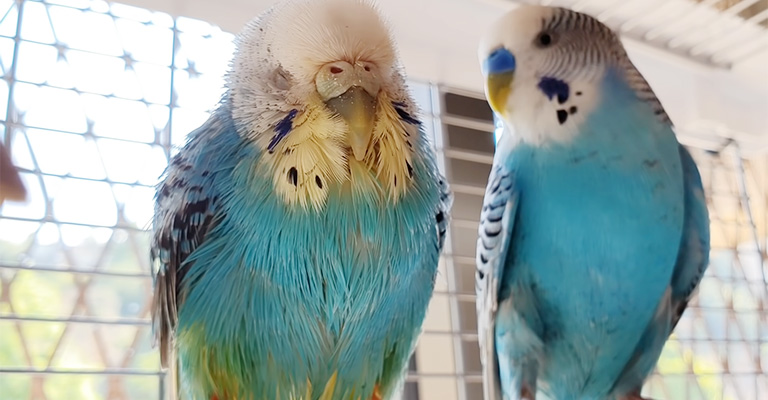
While it may not be possible to eliminate the risk of budgie deaths entirely, there are measures you can take to minimize the chances of sudden deaths. Here are six preventive steps you can follow:
Provide Proper Nutrition
Ensure that your budgies receive a balanced diet that includes a variety of fresh fruits, vegetables, high-quality pellet food, and occasional treats formulated for budgies. Avoid feeding them a seed-only diet, as it lacks essential nutrients.
Maintain a Clean and Safe Environment
Regularly clean the budgie’s cage, including perches, food dishes, and toys, to prevent the buildup of bacteria or parasites. Avoid using harsh chemicals or toxic substances near the budgies. Keep the cage in a well-ventilated area away from drafts and extreme temperatures.
Veterinary Care and Regular Check-ups
Schedule regular visits to an avian veterinarian who can monitor your budgies’ health, provide vaccinations if necessary, and conduct routine check-ups. Early detection of any health issues can greatly improve the chances of successful treatment.
Social Interaction and Mental Stimulation
Budgies are social creatures and require regular socialization and mental stimulation. Spend time interacting with your budgies daily, provide toys, perches, and opportunities for exercise, and consider having more than one budgie to prevent loneliness.
Quarantine New Budgies
If you introduce new budgies to your flock, it’s important to quarantine them for a period of time before allowing direct contact with your existing budgies. This helps prevent the spread of potential diseases or infections.
Avoid Breeding From Unhealthy Birds
If you plan to breed budgies, ensure that the parent birds are in good health and free from genetic disorders. Breeding from unhealthy birds can pass on potential health issues to their offspring.
Educate Yourself About Budgie Care
Stay informed about proper budgie care, including their dietary needs, environmental requirements, and common health issues. Consult reputable sources such as avian veterinarians, avian care books, or reputable websites.
Remember, each budgie is unique, and it’s essential to observe them closely for any signs of illness or distress. If you notice any unusual behavior, changes in appetite, breathing difficulties, or other concerning symptoms, consult with an avian veterinarian promptly.
FAQs
Budgies are highly social birds, and prolonged loneliness or lack of social interaction can lead to stress, depression, and ultimately, health problems that may result in death.
Overbreeding can lead to reproductive issues and strain on a budgie’s body, resulting in poor health, decreased lifespan, and increased mortality rates.
Extreme temperatures, both hot and cold, can be detrimental to budgies. It is important to keep them in a temperature-controlled environment to prevent health complications.
Obesity can significantly impact a budgie’s health and lifespan. It can lead to heart problems, respiratory issues, and a weakened immune system, making them more susceptible to diseases.
A sedentary lifestyle can contribute to obesity, muscle weakness, and overall poor health. Regular exercise is essential to keep budgies physically fit and mentally stimulated.
Wrapping Up!
That was all about ‘Why do my budgies keep dying’. The repeated deaths of budgies can be distressing for owners, but understanding the natural lifespan of budgies, common causes of budgie deaths, and preventive measures can help mitigate the risks.
By providing a nutritious diet, a clean and stress-free environment, regular veterinary care, and ample mental and physical stimulation, you can significantly increase the lifespan and overall well-being of your budgies.
Remember to consult with an avian veterinarian for specific guidance tailored to your budgies’ needs, and always prioritize their health and happiness.